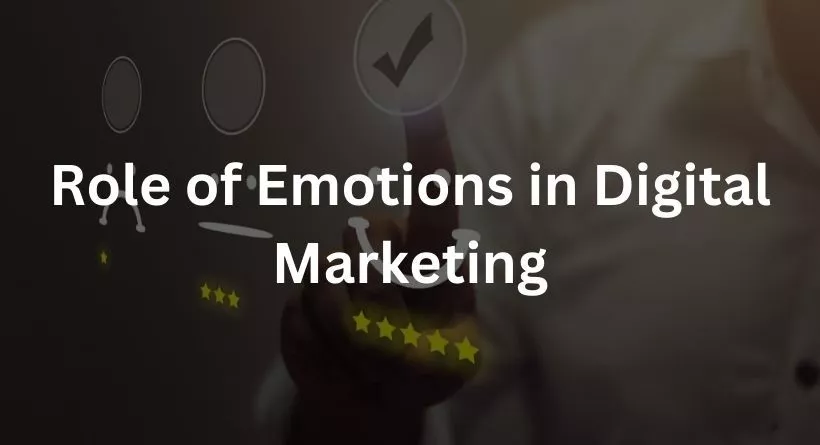
Emotions have a profound impact on human decision-making and behaviour. In the realm of digital marketing, understanding and leveraging emotions can significantly influence consumer engagement, brand loyalty, and purchasing decisions. Emotional connections with brands and their content create memorable experiences that resonate with audiences. This article explores the crucial role of emotions in digital marketing and how businesses can effectively tap into this powerful aspect of human psychology.
1. The Power of Emotions in Decision-Making
Emotions play a significant role in human decision-making, often influencing purchasing choices and brand preferences. Brands that evoke positive emotions tend to create stronger connections with their audience.
2. Building Emotional Connections with Brands
Emotional connections with brands go beyond product features or pricing. Brands that align with their audience’s values, aspirations, and beliefs can establish lasting emotional bonds that foster brand loyalty.
3. Emotionally-Driven Content Marketing
Content that evokes emotions is more likely to be remembered and shared by audiences. Emotional content, whether heartwarming, humorous, or inspiring, resonates deeply and leaves a lasting impact.
You may also like reading: Best business phone systems of 2023
4. The Use of Storytelling in Eliciting Emotions
Storytelling is a powerful tool in digital marketing. Brands that craft compelling narratives can tap into their audience’s emotions, creating a sense of relatability and authenticity.
5. Creating Memorable Brand Experiences
Memorable brand experiences that trigger positive emotions are essential for building a loyal customer base. Whether through exceptional customer service or unique interactive campaigns, emotions influence how customers perceive and remember a brand.
6. Emotions in Visual and Video Marketing
Visual and video marketing have a profound emotional impact. Powerful visuals and compelling video storytelling can evoke emotions, making content more shareable and engaging.
7. The Role of social media in Eliciting Emotions
Social media platforms are fertile ground for emotional marketing. Brands can use social media to connect with audiences on a personal level, sparking conversations and eliciting emotional responses.
8. Emotional Design and User Experience (UX)
Emotional design and user experience (UX) take into account how design elements, colors, and typography can evoke specific emotions. A positive emotional experience leads to increased user engagement and satisfaction.
9. Emotions in Email Marketing
Email marketing can effectively tap into emotions through personalized, empathetic, and value-driven content. Emotional subject lines and persuasive storytelling can drive higher open and click-through rates.
10. The Influence of Emotional Branding
Emotional branding involves associating a brand with specific emotions or values. Emotionally-branded campaigns create brand affinity and strengthen brand identity.
11. Ethical Considerations in Emotional Marketing
While emotions can be a powerful tool in marketing, ethical considerations are essential. Marketers must use emotions responsibly, avoiding manipulative tactics or misleading practices.
12. Measuring Emotional Engagement

Measuring emotional engagement involves analyzing customer feedback, sentiment analysis, and user behaviour to understand how emotions influence audience interactions with a brand.
13. Empathy and Emotional Intelligence in Marketing
Empathy and emotional intelligence are valuable traits in marketers. Understanding and empathizing with the audience’s emotions enable marketers to create more impactful and relevant campaigns.
14. Understanding Cultural Differences in Emotional Appeal
Emotional appeal can vary across cultures and regions. Marketers must consider cultural differences when crafting emotionally-driven content to ensure it resonates with diverse audiences
Conclusion
Emotions are a driving force in human decision-making, and digital marketing harnesses this power to create meaningful connections with audiences. By understanding the role of emotions and employing emotionally-driven strategies, businesses can forge strong brand loyalty, engage with their audience on a deeper level, and leave a lasting impact on their customers. Emotionally resonant marketing campaigns create authentic and memorable experiences, fostering brand advocacy and driving long-term success in the digital landscape.
FAQs
What is the role of emotions in marketing?
Emotional marketing may influence customers to participate through shares, comments, and referrals in addition to actual purchases. Customers may be more inclined to share an advertising on their own social media sites if it makes them pleased. Similar to happiness, grief or fear can motivate buyers to act.
How emotions can be used in developing marketing strategies?
When establishing your brand and using emotion in marketing, you may more effectively target particular customer experiences. You may determine how your product or service responds to these requirements and wants if you have a clear understanding of those of your target market.
How do emotions attract customers?
Events, experiences, and even advertising that have an emotional impact tend to linger with people because emotion has a strong relationship to memory. Make your audience feel something, and they’ll remember you that much more.





